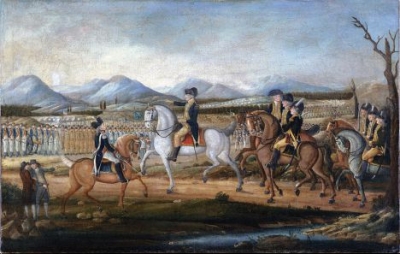The Whiskey Rebellion began in 1791, during the presidency of George Washington. It was provoked by the imposition of an excise tax on distilled spirits. The new excise was a part of treasury secretary Alexander Hamilton’s program to fund war debt incurred during the Revolutionary War.
The tax infuriated farmers in the western frontier regions who were long accustomed to distilling their surplus grain and corn into whiskey. The protestors considered the tax a confiscation of their rightfully earned profits.
The westerners had other grievances as well with the national government, including the perception that the government was not adequately protecting their frontier from Native Americans, and that they were prohibited (by Spain) from using the Mississippi River for commercial navigation. Until these issues were addressed, westerners felt the government was ignoring their security and economic welfare, so why should they pay taxes that, in their perceptions, were only used for the betterment of the easterners?
Throughout counties in Western Pennsylvania, protesters met would-be tax collectors with pitchforks, tar and feathers, and even gunfire.
In May of 1791, federal district attorney William Rawle issued subpoenas for more than 60 distillers in Pennsylvania who had not paid the excise tax. Distillers who received these writs were obligated to travel to Philadelphia to appear in federal court. For farmers on the western frontier, such a journey was expensive and time-consuming. This was the last straw.
Resistance came to a climax on this day in history, when a mob of more than 500 armed men near Pittsburgh burned the homes of the whiskey-tax collector and the U.S. Marshall, forcing them to take their families and flee the area. The remaining tax collectors in the area followed or resigned.
President Washington ordered Treasury Secretary Alexander Hamilton to raise an army of 13,000 to subdue the rebels. The rebels disbanded before the arrival of the army, however, and there was no confrontation. About 20 men were arrested, but all were later acquitted or pardoned.
The whiskey excise remained difficult to collect, however, and was repealed after Thomas Jefferson’s Republican Party, which opposed policies promulgated by Hamilton’s Federalist Party, came to power in 1801.
thanks to:https://legallegacy.wordpress.com/2015/07/16/july-16-1794-climax-of-whis...
















